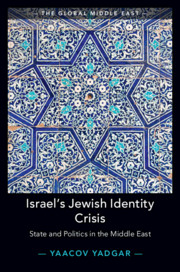Book contents
- Israel’s Jewish Identity Crisis
- The Global Middle East
- Israel’s Jewish Identity Crisis
- Copyright page
- Dedication
- Contents
- Preface
- Introduction
- 1 The Politics of Religious Conversion and the Limits of Zionist Nationhood
- 2 Israel as the Nation-State of the Jewish People?
- 3 Two Contemporary Debates on Zionism and Secularism
- 4 Non-Jewish Israeli Nationalism and the Limits of Israeliness
- Conclusion
- Bibliography
- Index
1 - The Politics of Religious Conversion and the Limits of Zionist Nationhood
Published online by Cambridge University Press: 09 January 2020
- Israel’s Jewish Identity Crisis
- The Global Middle East
- Israel’s Jewish Identity Crisis
- Copyright page
- Dedication
- Contents
- Preface
- Introduction
- 1 The Politics of Religious Conversion and the Limits of Zionist Nationhood
- 2 Israel as the Nation-State of the Jewish People?
- 3 Two Contemporary Debates on Zionism and Secularism
- 4 Non-Jewish Israeli Nationalism and the Limits of Israeliness
- Conclusion
- Bibliography
- Index
Summary
Chapter 1 focuses on the issue of religious conversion to Judaism and the ways in which this has been constructed to facilitate Israel’s identity as the embodiment of the sovereignty of Jews. Like in other chapters of the book, Yadgar argues here that an explosive, expansive debate on the role and nature of religious conversions in Israeli hides as much as it reveals. Yadgar’s deconstruction of this debate – which forms the main body of the chapter – allows him to argue that the discourse on religious conversions in Israel establishes a “division of labor” where those identified as “religious” are burdened with the task of doing the liberals’ dirty work of racially marking the in-group and the out- group in Israel. Yadgar sees the debate on conversion as a distillation of the “status quo” narrative, which he also rejects. The chapter deals more fully with the issue of the lack of a political definition of Jewishness in a state that is premised exactly on the notion that Jewishness is a matter of political identity. It seems, Yadgar argues, that Zionist ideologues could not give a proper alternative to the religious framework from which they were seeking to break free. And the state, following them, simply failed to tackle this problem. Instead, it tasked the rabbis with what Yadgar calls the role of “national gatekeepers.” In short, Yadgar does not accept the narrative by which it is the rabbis who are to blame for a truly “uncomfortable” reality of discrimination. As the chapter shows, this discrimination is a prerequisite of the notion of a Jews’ state. At the end, this is all about pitting Jews as a majority against Arabs, who must remain a minority in order for the state to survive. This obviously makes Israel’s presence in the Middle East a “problematic” matter, to say the least. Ironically, it is exactly the rabbis’ insistence on what secularist discourse sees as primitive notions of religion that exposes the un-Jewish nature of a “biological” understanding of Jewish identity.
- Type
- Chapter
- Information
- Israel's Jewish Identity CrisisState and Politics in the Middle East, pp. 33 - 77Publisher: Cambridge University PressPrint publication year: 2020

